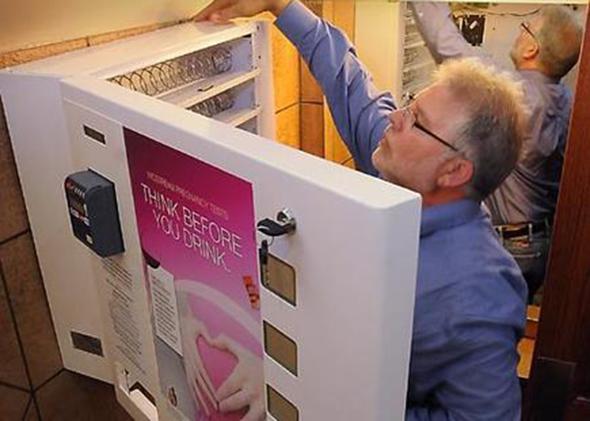Fetal alcohol syndrome is a serious problem in Alaska. Babies born there, particularly Native American babies, suffer the syndrome at much higher rates than infants in the lower 48. Since the first epidemiological data emerged in the mid-1990s, Alaskan FAS rates have declined somewhat, but creative solutions are still needed.
Here’s one: In the next few months, researchers from the University of Alaska–Anchorage will install 20 pregnancy test dispensers in the women’s restrooms in bars and restaurants in remote communities in Alaska. The dispensers will carry warnings about the risks of drinking while pregnant and display a phone number that women can call for more information. Putting the tests where women drink is a sensible idea. Nearly one-half of pregnancies in the United States are unintended, and many women go weeks not knowing they are pregnant. During that time, some of them binge drink and put the fetus at risk for birth defects, learning disabilities, and many other serious problems associated with FAS.
The pregnancy tests will be free. The state of Alaska will pay $800 per dispenser and $1.50 for each test. Free condoms will be available alongside the pregnancy tests. But the state won’t pay for them. (The research team organizing the dispenser project wouldn’t say how the condoms are funded.) The reason for this hole in state funding is a state senator named Pete Kelly.
Kelly is a human billboard for why politicians should not be directly involved in the management of public health programs. He cares about babies and also about women (once they’re pregnant, at least). He pushed through the pregnancy test program, and the researchers involved commend him for his efforts. For all his concern about children and pregnant women, though, Kelly, a Republican from Fairbanks who calls abortion an “American Holocaust,” has an obvious discomfort with sex. Icky, unmentionable sex, and those bits of latex that allow women to do dirty things without God’s intended consequences. Because Kelly was the main advocate for the pregnancy dispenser program, funding for condoms was not part of the proposal: He has made it quite clear that he does not support increasing access to contraception. Kelly says that birth control is for people who “don’t necessarily want to act responsibly,” and he practically cringed when he told an interviewer he wasn’t interested in helping people “do it.”
Kelly is in no position to lecture others about acting responsibly. Condom distribution programs work. We have plenty of evidence for this, and ignoring the facts is no way to help women and children. These programs reduce the transmission of sexually transmitted diseases and limit unintended pregnancies. They are particularly effective among youth and at-risk populations—precisely the people Alaska should be trying to reach in the state’s battle against FAS. There is no evidence that condom distribution encourages young people to have sex earlier in life.
The Alaskan government, despite Kelly’s squeamishness, has behaved commendably in the fight against FAS. The state established an agency to coordinate the effort. It launched a comprehensive plan to reduce underage drinking. It has worked with the federal government to establish training centers that educate health care providers and young people about the problem. And it has given away condoms. Last year, the state announced the “Wrap it up, Alaska” program to distribute condoms, using cute, Alaska-specific sayings. (“Drill safely” is my personal favorite.)
Putting pregnancy tests in bathrooms is a wonderfully innovative idea, but no one knows if it will work. The Alaska program is designed to provide some evidence. Communities that receive the dispensers will be compared with communities that receive only posters warning against FAS. Researchers, led by anthropologist and epidemiologist David Driscoll, will survey women in both communities about their understanding and beliefs about the disease, and will follow up six months later with a subset of the women. Even with that data, though, it will be years before we have any sense of whether the pregnancy tests are putting a dent in the number of FAS cases.
Minnesota started a similar program in 2012. Jody Allen Crowe, an anti-FAS advocate who has so far overseen the installation of 20 pregnancy test dispensers in Minnesota bar bathrooms, sees a big future for the programs. “Everyone asks who the DD is before going out,” he says, referring to designated drivers. “My goal is for people to ask, ‘Did all the girls PT?’”
Perhaps there will be a day when pregnancy tests are an integral part of a preparty ritual, but we’re not there yet. Today, condoms are the best tool to prevent unintended pregnancy, and preventing unintended pregnancies is the most effective way to prevent pregnant women from binge drinking. The $400,000 Kelly has pushed through the state legislature to fund the pregnancy tests feels like a battle against reality—he’s desperately searching for a way to prevent FAS without having to pay for condoms.
It’s past time for politicians to stop acting like adolescents who giggle when someone says “condom.” Admittedly, their discomfort with birth control can be hilarious when it doesn’t matter. Rick Santorum said during the 2012 campaign that states should be free to ban contraception, and people laughed at how out of touch he was. Trying to cut funding for contraceptives as part of humanitarian aid in Africa, however, isn’t so funny. One of the most effective public health tools in human history shouldn’t be taboo in our politics.
